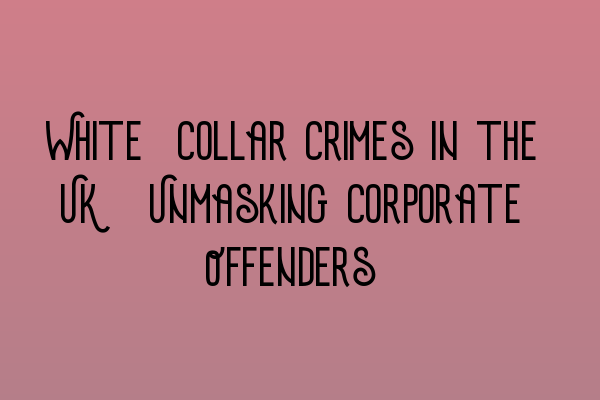White-Collar Crimes in the UK: Unmasking Corporate Offenders
White-collar crimes are a serious issue in the UK, often involving corporate offenders who exploit their positions of power for personal gain. These crimes can have a devastating impact on businesses, individuals, and the economy as a whole. In this article, we will delve into the world of white-collar crimes, explore some notable cases, and discuss the steps being taken to combat this illicit activity.
What are White-Collar Crimes?
White-collar crimes are non-violent offenses committed in a professional setting, typically by individuals in positions of trust or authority. These crimes are often financially motivated and involve deceit, fraud, or embezzlement. Examples of white-collar crimes include insider trading, money laundering, bribery, tax evasion, and corporate fraud.
Notable Cases
Over the years, the UK has witnessed several high-profile cases of white-collar crimes. One such case is the Enron scandal, where top executives manipulated financial statements to hide debt and inflate profits, eventually leading to the company’s collapse. Another notable case is the Libor scandal, where major banks manipulated interest rates for their own benefit, causing significant harm to the global financial system.
These cases serve as a reminder of the devastating impact that white-collar crimes can have on businesses, shareholders, and the public. They also highlight the importance of robust regulatory frameworks and effective enforcement mechanisms to prevent and punish such offenses.
Combating White-Collar Crimes
The UK has implemented various measures to combat white-collar crimes and hold corporate offenders accountable. One such measure is the establishment of dedicated law enforcement agencies such as the Serious Fraud Office (SFO) and the Financial Conduct Authority (FCA). These agencies work tirelessly to investigate, prosecute, and deter white-collar criminals.
In addition to law enforcement efforts, the UK has also introduced legislative reforms to strengthen the regulatory framework. The Criminal Finances Act 2017, for example, introduced new powers and obligations to tackle money laundering and corporate tax evasion. The Bribery Act 2010 is another significant piece of legislation that focuses on preventing bribery and corruption in both the public and private sectors.
To ensure the effective detection and prevention of white-collar crimes, it is crucial for individuals and businesses to stay informed and educated. Aspiring solicitors, in particular, must have a solid understanding of criminal law and practice. The SQE Exam Prep: Essential Study Materials for Aspiring Solicitors is a valuable resource for those preparing to take the Solicitors Qualifying Examination (SQE) in the UK.
Conclusion
White-collar crimes pose a significant threat to the integrity of the UK’s economy and society. It is essential for all stakeholders, including government agencies, businesses, and individuals, to work together to combat these offenses. Through robust regulatory frameworks, effective enforcement mechanisms, and continuous education, we can unmask corporate offenders and create a safer and more transparent business environment.
Related Articles:
